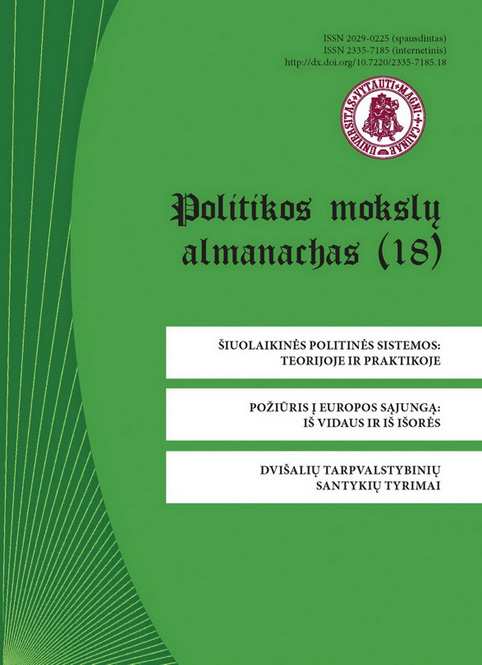Vidaus ir užsienio politikos liberalizavimo procesas: Ukrainos ir Europos Sąjungos bendradarbiavimo energetikos srityje atvejis
THE PROCESS OF LIBERALIZATION OF FOREIGN AND DOMESTIC POLICY: THE CASE OF UKRAINE – EUROPEAN UNION ENERGY COOPERATION
Author(s): Mykola IakovenkoSubject(s): Politics / Political Sciences
Published by: Vytauto Didžiojo Universitetas
Keywords: Liberalization; Neoliberal institutionalism; Third energy package; EU foreign policy; Ukraine; Transformations
Summary/Abstract: This article is devoted to the analysis of the liberalization process on the example of Ukraine – European Union (EU) energy cooperation. Due to complexity of these processes, the main idea of the article is to demonstrate how some general international requirements may be completed by the state in a process of cooperation and domestic liberal transformations. Liberalization is presented as an integral part of the effective cooperation between the counterparts in conditions of international regime existence. Thus, this process is connected to the foreign policy of the state, as well as to the domestic reforms and transformation that may create possibilities for compliance with the international regulations. The example of energy cooperation is quite representative, since the tendencies of neoliberalization processes and establishment of the market rules can be observed in the European Union’s energy cooperation policy nowadays. On the other hand, cooperation with Ukraine is quite complicated at the current stage, however, this state has already started the implementation of the EU requirements in the sphere of energy cooperation. Therefore, analysis of this process may demonstrate some particular modern aspects of liberalization processes in East-Central Europe in current geopolitical and economic conditions.Šio straipsnio tikslas – išanalizuoti liberalizacijos procesą Ukrainos ir ES energetinio bendradarbiavimo kontekste, siekiant pademonstruoti, kaip valstybės įgyvendina bendrus tarptautinius reikalavimus ir kaip tai gali paveikti valstybės vidaus struktūrų ir procesų liberalizavimo transformaciją. Liberalicazija pristatoma kaip efektyvaus tarptautinio režimo dalyvių bendradarbiavimo integrali sudedamoji. Dėl šios priežasties liberalizacija yra susijusi su valstybių užsienio politika, vidaus politikos reformomis ir transformacijomis, kurios sukuria prielaidas įvykdyti tarptautinius reikalavimus. Šiame kontekste ES energetinis bendradarbiavimas pasižymi neoliberalizacijos procesais, laisvosios rinkos taisyklių propagavimu ir įtvirtinimu. Šiuo metu Ukrainos ir ES bendradarbiavimas energetikos srityje yra komplikuotas, tačiau Ukraina jau pradėjo įgyvendinti energetinio bendradarbiavimo reikalavimus, o išanalizavus šį procesą, matomi vykstančios liberalizacijos geopolitiniai ir ekonominiai aspektai Rytų ir Vidurio Europoje.
Journal: Politikos mokslų almanachas
- Issue Year: 2015
- Issue No: 18
- Page Range: 79-103
- Page Count: 25
- Language: English

